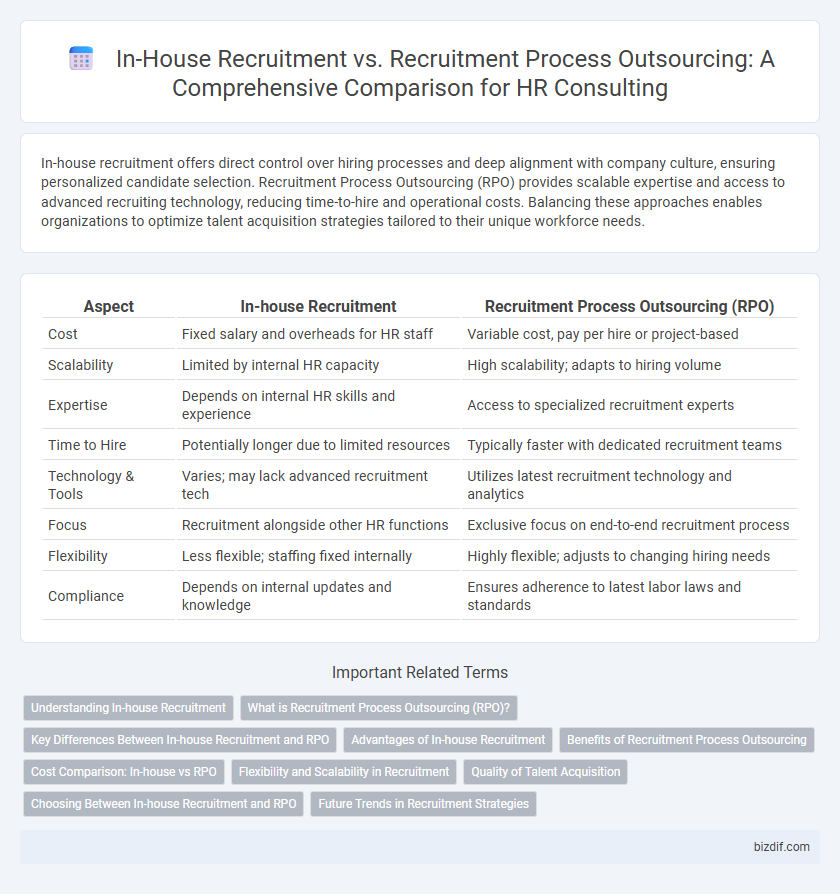In-house recruitment offers direct control over hiring processes and deep alignment with company culture, ensuring personalized candidate selection. Recruitment Process Outsourcing (RPO) provides scalable expertise and access to advanced recruiting technology, reducing time-to-hire and operational costs. Balancing these approaches enables organizations to optimize talent acquisition strategies tailored to their unique workforce needs.
Table of Comparison
| Aspect | In-house Recruitment | Recruitment Process Outsourcing (RPO) |
|---|---|---|
| Cost | Fixed salary and overheads for HR staff | Variable cost, pay per hire or project-based |
| Scalability | Limited by internal HR capacity | High scalability; adapts to hiring volume |
| Expertise | Depends on internal HR skills and experience | Access to specialized recruitment experts |
| Time to Hire | Potentially longer due to limited resources | Typically faster with dedicated recruitment teams |
| Technology & Tools | Varies; may lack advanced recruitment tech | Utilizes latest recruitment technology and analytics |
| Focus | Recruitment alongside other HR functions | Exclusive focus on end-to-end recruitment process |
| Flexibility | Less flexible; staffing fixed internally | Highly flexible; adjusts to changing hiring needs |
| Compliance | Depends on internal updates and knowledge | Ensures adherence to latest labor laws and standards |
Understanding In-house Recruitment
In-house recruitment involves a dedicated internal team managing the entire hiring process, ensuring alignment with company culture and immediate stakeholder collaboration. This approach allows for direct control over candidate sourcing, screening, and onboarding, facilitating tailored recruitment strategies that meet specific organizational needs. Companies leveraging in-house recruitment benefit from deeper institutional knowledge and stronger employer branding, which can improve candidate quality and retention rates.
What is Recruitment Process Outsourcing (RPO)?
Recruitment Process Outsourcing (RPO) is a strategic HR solution where an external provider manages the entire recruitment cycle, from candidate sourcing to onboarding, delivering scalable and cost-effective hiring. RPO offers advanced technology, specialized expertise, and data-driven insights, enhancing talent acquisition efficiency compared to traditional in-house recruitment teams. Companies leveraging RPO benefit from reduced time-to-fill positions, improved candidate quality, and the ability to focus internal resources on core business operations.
Key Differences Between In-house Recruitment and RPO
In-house recruitment involves managing the entire hiring process internally, emphasizing direct control over candidate sourcing, employer branding, and recruitment strategy. Recruitment Process Outsourcing (RPO) delegates these tasks to external experts, offering scalability, access to advanced technology, and specialist recruitment expertise. Key differences include cost structure, recruitment speed, candidate quality, and the strategic focus between internal resource allocation and external partnership.
Advantages of In-house Recruitment
In-house recruitment offers deeper alignment with company culture and values, enabling more precise candidate matching and stronger employee retention rates. It provides direct control over the hiring process, ensuring tailored recruitment strategies that meet specific organizational needs and immediate feedback loops. Cost-effectiveness emerges through reduced agency fees and better integration with internal teams, enhancing overall recruitment efficiency.
Benefits of Recruitment Process Outsourcing
Recruitment Process Outsourcing (RPO) offers scalable hiring solutions that improve time-to-fill metrics and reduce overall recruitment costs by leveraging specialized expertise and advanced technology. RPO providers enhance candidate quality through data-driven sourcing strategies and ensure compliance with evolving labor laws, minimizing legal risks. This model allows companies to focus on core business activities while maintaining flexibility to adjust recruitment efforts based on fluctuating workforce demands.
Cost Comparison: In-house vs RPO
In-house recruitment incurs costs such as salaries, training, technology, and overhead, which can escalate with high volume hiring and seasonal demand fluctuations. Recruitment Process Outsourcing (RPO) offers scalable pricing models that convert fixed costs into variable expenses, often resulting in reduced cost-per-hire and improved recruitment efficiency. Organizations leveraging RPO benefit from access to specialized talent acquisition technology and expertise, often achieving faster fill rates and lower total recruitment expenditure compared to maintaining an internal recruitment team.
Flexibility and Scalability in Recruitment
In-house recruitment offers direct control and immediate alignment with company culture but often struggles with scalability during peak hiring periods. Recruitment Process Outsourcing (RPO) provides flexible resource allocation and scalable recruitment solutions that adapt to fluctuating hiring demands across multiple locations. Leveraging RPO enables organizations to quickly expand or reduce recruitment efforts without the fixed overhead costs associated with internal recruitment teams.
Quality of Talent Acquisition
In-house recruitment teams often have deeper company culture insights, enabling them to identify candidates who align closely with organizational values, which enhances the quality of talent acquisition. Recruitment Process Outsourcing (RPO) providers leverage advanced technologies and extensive talent networks to deliver a broader pool of highly qualified candidates, improving recruitment efficiency and quality. Combining internal knowledge with RPO expertise can optimize candidate quality by ensuring both cultural fit and access to diverse talent pipelines.
Choosing Between In-house Recruitment and RPO
Choosing between in-house recruitment and Recruitment Process Outsourcing (RPO) depends on company size, hiring volume, and budget constraints. In-house recruitment offers greater control and alignment with company culture but can strain internal resources during high-volume hiring. RPO provides scalability, access to specialized talent acquisition expertise, and quicker time-to-fill metrics, making it ideal for companies facing fluctuating staffing needs or seeking to optimize recruitment efficiency.
Future Trends in Recruitment Strategies
Future trends in recruitment strategies emphasize the growing integration of artificial intelligence and data analytics, driving efficiency in both in-house recruitment and Recruitment Process Outsourcing (RPO). Companies increasingly prioritize scalable solutions, with RPO providers offering advanced talent acquisition technologies and specialized market insights to adapt to dynamic labor markets. Hybrid models combining internal HR teams with external RPO expertise are emerging as a strategic approach to enhance candidate quality and reduce time-to-hire.
In-house Recruitment vs Recruitment Process Outsourcing Infographic

 bizdif.com
bizdif.com